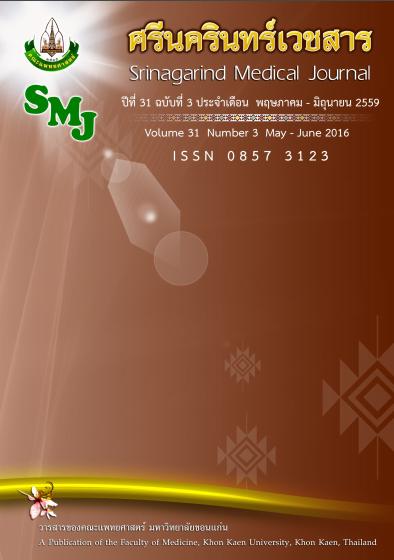Warfarin using knowledge and international normalized ratio goal control in outpatients of Queen Sirikit heart center of the northeast
Abstract
Background and Objectives: Warfarin using knowledge is one of the factors that may affect to International Normalized Ratio (INR) control. This study aims to (i) assess warfarin using knowledge, (ii) investigate the factors that may affect the warfarin using knowledge, and (iii) investigate the association between warfarin knowledge and INR control of outpatients who visit warfarin clinic, Queen Sirikit Heart Center of the Northeast
Methods: Using the questionnaire modified from Warfarin Knowledge Assessment Questionnaire (WKA), this cross-sectional study randomly evaluated warfarin using knowledge in outpatients who visit warfarin clinic, Queen Sirikit Heart Center of the Northeast on Thursday during October 2013 to January 2014. INR values were retrospectively reviewed from medical records of the past 2 years. To assess INR control, they were calculated as the percent time in therapeutic range (%TTR).
Results: Of 206 patients interviewed, the mean ± SD of their warfarin using knowledge was 13.6 ± 2.4 from 18 scores. Patients with the “passing” scores were 72.8%. The knowledge with the least correct answer were the domain of regulation about taking food, and the domain of comprehension and awareness of importance of INR goal and recognizing the INR goal. Patient’s age and education level were statistically associated with patient warfarin using knowledge (p<0.05). We found that patients have the average %TTR of 40.2%. However, it is not statistically associated with warfarin using knowledge (p = 0.882).
Conclusions: Most patients have passing scores for the warfarin knowledge assessment. However, the knowledge of some domains is still in poor level, including the domain of food-drug interaction, and the awareness and recognizing of the INR goal. The improvement of patient warfarin knowledge in some particular domains is suggested.




